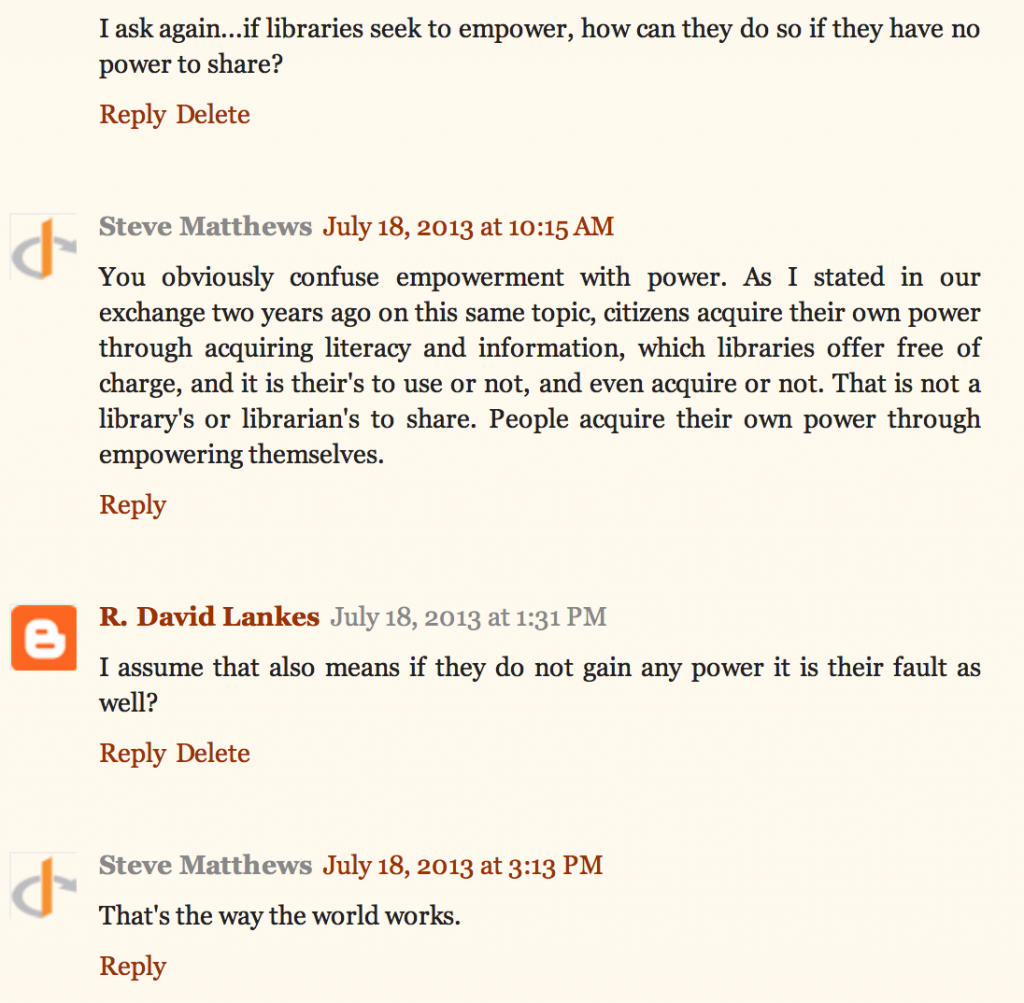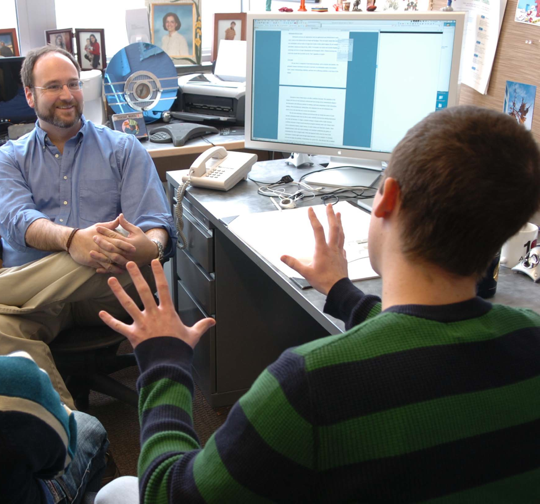I have been engaged in a discussion of librarians and power with Steve Matthews over on the BeerBrarian Blog:
http://beerbrarian.blogspot.com/2013/07/thoughts-on-new-librarianship-week-one.html?showComment=1373647786790#c3322455378238735629 (great post, but this is happening in the comments).
It would have stayed there, but my latest response is simply too big, and I’d rather be complete than terse. Also, I think these ideas on the role of libraries and librarians is of general importance I wanted to share. So here is the setup that kicked off this response:

Now, my response:
Steve I can honestly say your reply left me speechless. It was, for me, a moment of clarity as to why we disagree so fundamentally when reading your blog I see so much similarity. I see now your objection to my views on power, and I also see we are never going to agree upon them. So let this be my final comment.
I agree that as with learning, no one can force someone to accept power, or a service, or make a decision that one party defines as beneficial. In essence just because a librarian seeks to empower an individual or community does not mean that individual has to accept it. This is why education has been turned on its head from teacher-centric to learner-centric. Ultimately taking power, like learning, is a choice.
However, where I fundamentally disagree is that all individuals are given the same choices. That in essence all individuals and communities have the same opportunity to say yes to empowerment and therefore are never presented choices for power at all.
This is obviously a larger issue of social equity or social justice to use a more loaded term. If you live in Detroit today, you do not have access to the choices as someone who lives in Ann Arbor. The police and emergency units will show up in no less than an hour. You will have access to fewer libraries, your urban schools will underperform. Can someone in this setting overcome these obstacles on their own? Some can. The media is replete with stories of those they have, though often integral to these stories are mentors and heroes that made it happen.
I will simply mention other things that for long has robbed people of their choices of empowerment: race, gender, sexual orientation, poverty, and religion among other things. If we as a society subscribe that all people are created equal, and all people deserve an equal chance at success (note not an equal guarantee of it) then we endeavor to establish a level playing field of empowerment – literally social mechanisms of empowerment. This combination of private agencies (foundations), public agencies (like schools and libraries), marketplace agencies (training and internships), and religious agencies (charity and services) seek to establish bases of power (access to opportunities, skill sets, money, a regulatory context) that can be shared with the citizenry – though often in radically different ways and at times for conflicting different reasons. These agencies all are active in their impact and outreach – an outreach that represents a worldview (the role of government, the prioritization of a given group, the best means of empowerment) full of biases and points of view.
So these services and individuals seek to empower in a context of values and means. Often they conflict. And in these conflicts, gaps of opportunity either arise or are created. So that an individual may be deprived of opportunities and choices. Therefore he or she can be left without power not by the choices they make, but by the circumstances he or she finds themselves in.
If we believe, as I do, that librarians and libraries support the importance of things like equal access to knowledge, and prepared access to the democratic process we must first seek the power to do that. In the civic sector that comes in the form of charters and tax dollars. In essence a social compact with a community. We then use this power to offer it back to these communities, adhering to our values as agreed upon in that negotiation with the community (through boards, and budget votes).
Will all members of the community then accept or even agree with the power being offered (literacy, confidential access to the net, proxy battles against censorship, etc)? No, but they offer it so more members of society can choose empowerment.
To say the world works by people choosing either to empower themselves or not as if they all have the same choices to make ignores not only the reality of ongoing discussions on the role of government, but massive changes in societal opportunities brought about through the civil rights movement, women’s liberation, and child labor laws to only mention a few.
Now one may say that these movements didn’t come directly from the work of librarians. I would, again, disagree. Librarians and libraries did play a role, even if indirectly. Greater democratic participation and civic transparency was very much a goal of Carnegie’s library building. The advent of fiction collections and youth services was a proactive change in library service to meet the growing wealth of the middle class and a renewed emphasis on education. Open stacks still stand as a testament to open inquiry against the counter examples in repressive regimes.
In the first Arab Spring during protests in Alexandria all the prisons were opened and rapist and murders and thugs were put on the street to creat looting mobs to intimidate and invalidate the protests. The mobs went from government building to government building burning and vandalizing them.
These mobs then turned to the New Library of Alexandria. A structure built by the corrupt regime and whose board included the wife of the president. Protestors, men woman and children, gathered hand in hand to surround the building to protect it. By the end of the uprising, not one window was broken and not one rock thrown against its walls. The protestors even draped a flag across the stairs of the library, and every morning protester would touch and kiss the flag as they went out to march – in essence retaking the library for the community.
Why protect it? Because of the less than 10 year history of the library, the librarians and the staff did their jobs. The provided opportunity to learn, and engage in dialog with the local and global community. By embracing a belief that their work empowered people to learn, not just a party line, but whatever the learner wanted, they gave voice to those who had none. You could say they were being unbiased, but I would say in the pressure to tow the party line, they showed a strong bias toward open inquiry and serving the needs of the people over the government.
The world we live in is too complex to simply say people chose to be illiterate, or poor, or powerless. Certainly some do. But for those who choose to read they need a teacher willing to share their power of reading. For those who choose to fight to get out of poverty they need those who choose to provide access to online business sites that now require an online application even to be a janitor. And for those guaranteed the right to vote, they need access to documentation and voter registration be they democrat, republican, or independent. Without this empowering assistance they have no real choices. Only the illusion of it. And the illusion of choice and power may make the powerful sleep well at night, but it ultimately allows them to continually deprive power.
And so we come full circle to librarians and libraries. Do librarians seek out power, yes. They do so in order to serve. They do so in order to make powerful the individuals and communities and institutions they serve. But they do so in accordance with a set of professional values. Is the power they acquire neutral? No power is neutral – all power comes from some inequity. You are powerful on the playing field because you are faster or stronger. You are powerful in business because you have bigger profits, or better products. In government because of the size of your constituency. And you are powerful as a librarian because of your skills, and your credibility (that comes from performance and being intellectually honest about biases in an attempt toward unbiased).
This power of the librarian is also a large part of the power of a library. By sharing this power with the community through providing services, individuals and groups gain power. Some will chose not to accept it. But for far too many this will be their only opportunity to make decisions to lead to their own empowerment. Did the individual make the choice? Sure, but the library and librarian made the choice possible. And, they must continuously fight for the resources to do that.


 I am very pleased to announce that I will be joining the
I am very pleased to announce that I will be joining the 

 The short version:
The short version:
